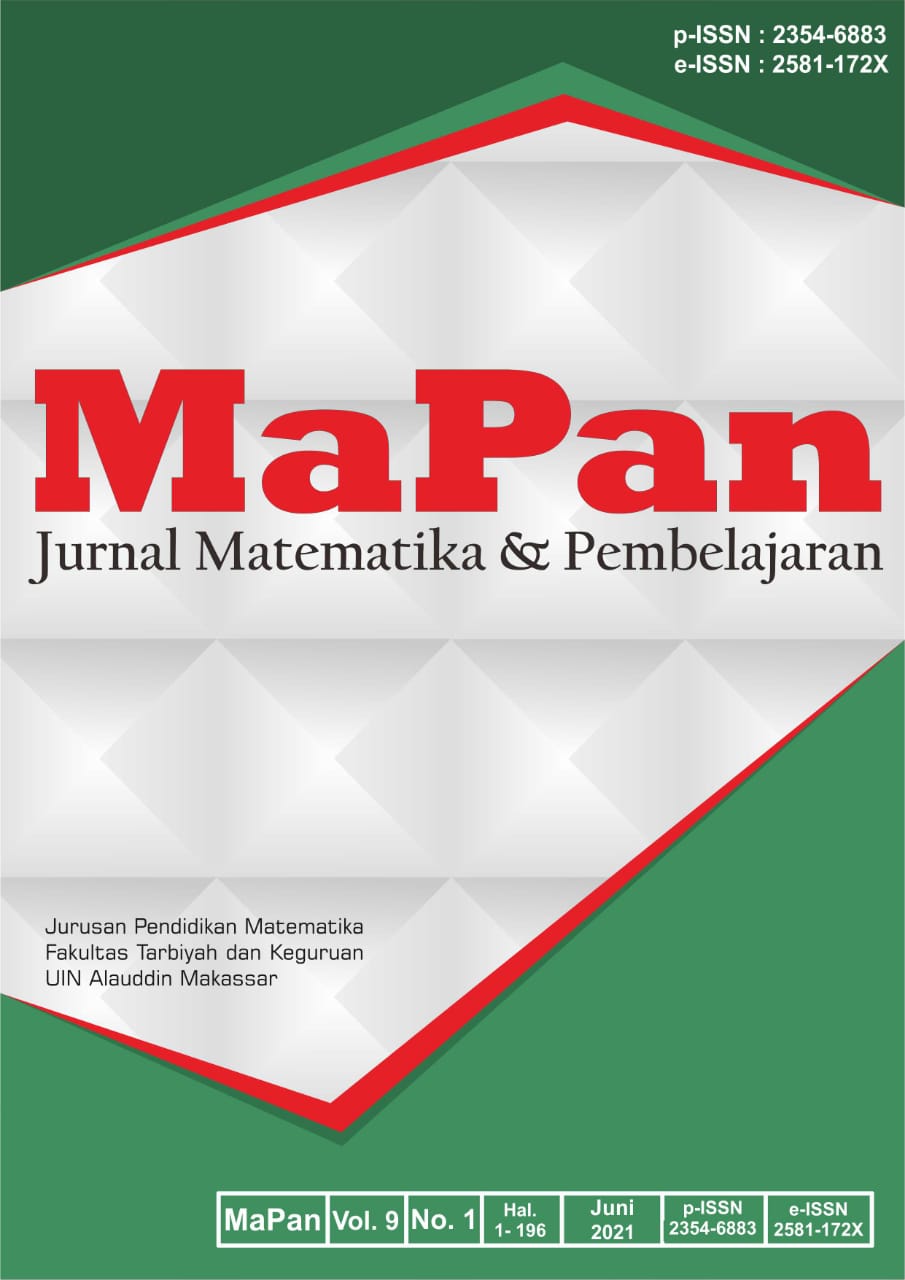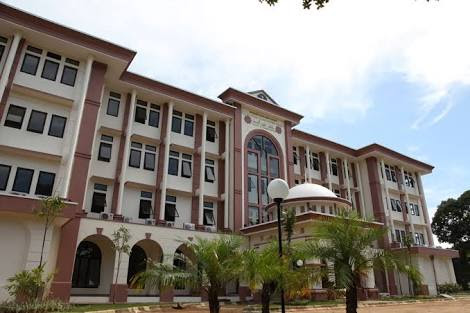ANALYSIS OF STUDENTS’ MATHEMATICAL LITERACY SKILL IN SOLVING PISA MATHEMATICAL PROBLEMS
Abstract
This study aims to determine students’ mathematical literacy skills in solving PISA mathematical problems. Mathematical literacy is the capacity of individuals to formulate, use, and interpret mathematics in various contexts. Students’ mathematical literacy skills can be seen in the way students work in solving PISA questions. This study is qualitative descriptive research. Data from the analysis of students’ mathematical literacy skills were obtained through tests in the form of descriptive questions adopted from PISA questions, analysis based on indicators of mathematical literacy skill according to PISA, and the interview results with students who worked on the PISA questions. This study shows that students’ mathematical literacy skills were in the medium to the low category; this can be seen from the percentage of students’ answer scores in working on PISA questions. Therefore, it is necessary to provide reasoning questions such as PISA questions to help students improve their mathematical literacy skills.
Downloads
References
Akbar, G. A. M., Diniyah, A. N., Akbar, F., Nurjaman, A., & Bernard, M. (2018). Analisis kemampuan kemampuan penalaran dan self confidence siswa SMA dalam materi peluang. Journal On Education, 1(1), 14–21. https://doi.org/10.31004/joe.v1i1.5.
As’ari, A. R. (2015). Berbagai permasalahan pembelajaran matematika dalam kurikulum 2013 dan beberapa upaya untuk mencoba mengatasinya. Conference Paper. https://doi.org/10.13140/2.1.1782.4807.
Asdarina, O., & Ridha, M. (2020). Analisis kemampuan penalaran matematis siswa dalam menyelesaikan soal setara pisa konten geometri. Numeracy, 7(2), 192–206. https://doi.org/10.46244/numeracy.v7i2.1167.
Colwell, J., & Mary, E. (2016). When I hear literacy: Using pre-service teachers’ perceptions of mathematical literacy to inform program changes in teacher education. Teaching and Teacher Education, 53, 63–74. https://doi. org/10.1016/j.tate.2015.11.001.
Fakhriyana, D., Mardiyana, & Aryuna, D. R. (2018). Analisis kemampuan literasi matematika dalam memecahkan masalah model programme for international student assessment (PISA) pada konten perubahan dan hubungan ditinjau dari kecerdasan logis matematis siswa kelas IX SMP Muhammadiyah program khusus surakarta. Jurnal Pendidikan Matematika Dan Matematika (JPMM) Solusi, 2(6), 421–434. https://doi. org/10.20961/jpmm%20solusi.v2i6.37672.
Fitriyani, I., & Mastur, Z. (2017). Kemampuan literasi matematika siswa ditinjau dari kecerdasan emosional pada pembelajaran CPS berbantuan hands on activity. Unnes Journal of Mathematics Education Research, 6(2), 139–147. Retrieved from https://journal.unnes.ac.id/sju/index.php/ujmer/article/view/20457.
Genlott, A. A., & Gronlund, A. (2016). Closing the gaps - Improving literacy and mathematics by ict-enhanced collaboration. Computers and Education, 99, 68–80. https://doi.org/10.1016/j.compedu.2016.04.004.
Hasibuan, S. A., Fauzi, K. M. A., & Mukhtar, M. (2019). Development of PISA mathematical problem model on the content of change and relationship to measure students mathematical problem-solving ability. International Electronic Journal of Mathematics Education, 15. https://doi.org/10.29333/iejme/6274.
Hayati, T. R., & Kamid, K. (2019). Analysis of mathematical literacy processes in high school students. International Journal of Trends in Mathematics Education Research, 2(3), 116. https://doi.org/10.33122/ijtmer.v2i3.70.
Hu, X., Gong, Y., Lai, C., & Leung, F. K. S. (2018). The relationship between ICT and student literacy in mathematics, reading, and science across 44 countries: A multilevel analysis. Computers & Education, 125, 1–13. https://doi.org/10.1016/j.compedu.2018.05.021.
Ketonen, E. E., & Hotulainen, R. (2019). Development of low-stakes mathematics and literacy test scores during lower secondary school – A multilevel pattern-centered analysis of student and classroom differences. Contemporary Educational Psychology, 59, 101793. https://doi.org/10.1016 /j.cedpsych.2019.101793.
Kiswanto, Kenedi, A., & Helsa, Y. (2017). Literasi matematis dalam pembelajaran berbasis masalah. Prosiding Seminar Nasional Pendidikan Guru Sekolah Dasar, 165–174. Retrieved from https://osf.io/538q2.
Kurniawati, I., & Kurniasari, I. (2019). Literasi matematika siswa dalam menyelesaikan soal pisa konten space and shape ditinjau dari kecerdasan majemuk. MATHEdunesa, 8(2), 441–448. Retrieved from https://jurnalmahasiswa.unesa.ac.id/index.php/mathedunesa/article/view/28917.
Masjaya, & Wardono. (2018). Pentingnya kemampuan literasi matematika untuk menumbuhkan kemampuan koneksi matematika dalam meningatkan SDM. PRISMA, Prosiding Seminar Nasional Matematika, 1, 568–574. Retrieved from https://journal.unnes.ac.id/sju/index.php/prisma/article/view/20196.
Munfarikhatin, A., Natsir, I., & Merauke, U. M. (2020). Analisis kemampuan literasi matematika siswa pada konten space and shape. Histogram: Jurnal Pendidikan Matematika, 4(1), 128–138. https://dx.doi.org/10.31100/ histogram.v4i1.569.
Muslimin, M., & Sunardi, S. (2019). Analisis kemampuan penalaran matematika siswa sma pada materi geometri ruang. Kreano, Jurnal Matematika Kreatif-Inovatif, 10(2), 171–178. https://doi.org/10.15294/kreano.v10i2.18323.
Newton, X. A. & Tonelli, E. P. (2020). Building undergraduate STEM majors’ capacity for delivering inquiry-based mathematics and science lessons: An exploratory evaluation study. Studies in Educational Evaluation, 64. https://doi.org/10.1016/j.stueduc.2019.100833.
OECD. (2006). Assessing scientific, reading and mathematical literacy: A framework for PISA 2006. Program for international student assessment, 192. https://doi.org/10.1787/9789264026407-en.
OECD. (2015). Learning for Tomorrow’s World First Results from PISA 2003.
OECD. (2017). PISA 2015 Mathematics framework. 65–80. https://doi.org/10.1787/9789264281820-5-en.
Ojose, B. (2013). Mathematics literacy : are we able to put the mathematics we learn into everyday use? Journal of Mathematics Education, 4, 89–100.
Purpura, D. J., Schmitt, S. A., & Ganley, C. M. (2017). Foundations of mathematics and literacy: The role of executive functioning components. Journal of Experimental Child Psychology, 153, 15–34. https://doi.org/10.1016/j.jecp.2016.08.010.
Rizki, L. M., & Priatna, N. (2019). Mathematical literacy as the 21st-century skill. Journal of Physics: Conference Series, 1157(4). https://doi.org/10.1088/1742-6596/1157/4/042088.
Rogers, K. C., & Kosko, K. W. (2019). How elementary and collegiate instructors envision tasks as supportive of mathematical argumentation: A comparison of instructors’ task constructions. The Journal of Mathematical Behavior, 53, 228–241. https://doi.org/https://doi.org/10.1016/j.jmathb.2018.08.004.
Sarama, J., & Clements, D. H. (2009). Early childhood mathematics education research: Learning trajectories for young children. Routledge. https://doi.org/10.4324/9780203883785.
She, H. C., Stacey, K., & Schmidt, W. H. (2018). Science and mathematics literacy: pisa for better school education. International Journal of Science and Mathematics Education, 16, 1–5. https://doi.org/10.1007/s10763-018-9911-1.
Stodolsky, S. S. (1988). The subject matters: Classroom activity in math and social studies. USA: University of Chicago Press.
Sumirattana, S., Makanong, A., & Thipkong, S. (2017). Using realistic mathematics education and the DAPIC problem-solving process to enhance secondary school students’ mathematical literacy. Kasetsart Journal of Social Sciences, 38(3), 307–315. https://doi.org/10.1016/j.kjss.2016.06.001.
Syawahid, M. (2019). Mathematical literacy in algebra reasoning. International Journal of Insight for Mathematics Teaching, 02(1), 33–46.
Tatto, M. T., Peck, R., Schwille, J., Bankov, K., Senk, S. L., Rodriguez, M., Ingvarson, L., Reckase, M., & Rowley, G. (2012). Policy, practice, and readiness to teach primary and secondary mathematics in 17 countries: findings from the IEA teacher education and development study in mathematics (TEDS-MM). ERIC.
Wati, M., Sugiyanti, & Muhtarom. (2019). Analisis kemampuan literasi matematika pada siswa kelas VIII SMP negeri 6 Semarang. Imajiner: Jurnal Matematika Dan Pendidikan Matematika, 1, 97–106.
Wutsqa, D. U. (2017). Kemampuan literasi matematika siswa SMP Negeri se-Kabupaten Bantul. Kemampuan Literasi Matematika Siswa SMP Negeri Se-Kabupaten Bantul, 5(2), 152–162. https://doi.org/10.21831/jpms.v5i2.15747.
Copyright (c) 2021 Yusfa Lestari, Abdur Rahman As’ari, Makbul Muksar

This work is licensed under a Creative Commons Attribution 4.0 International License.


